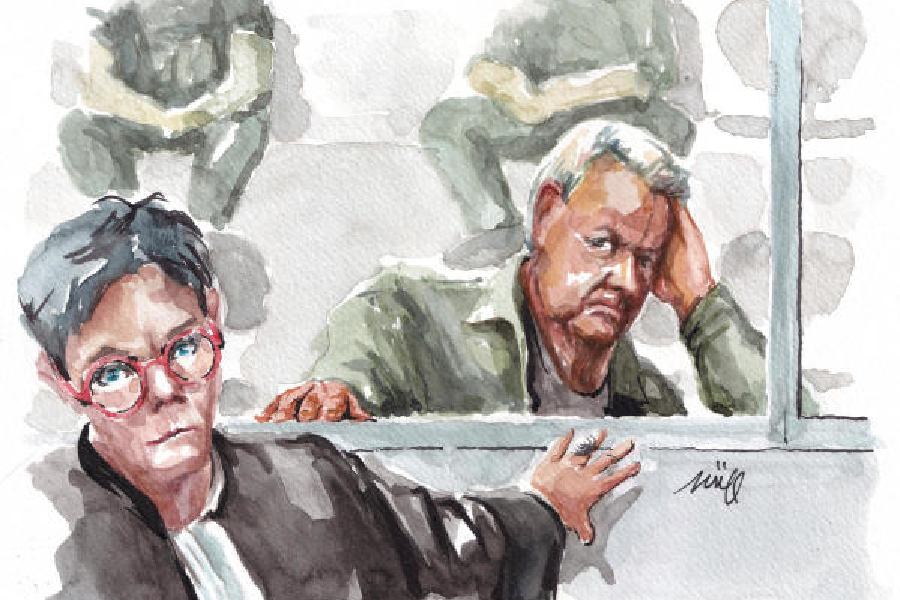At last, the man at the centre of a rape trial that has shocked France and drawn attention around the world spoke in court.
Dominique Pelicot explained how his wife had saved him from a childhood haunted by a sexual assault he said he had suffered in a hospital at age 9, and a gang rape he witnessed while working as an apprentice electrician on a construction site as a teen. He was crazy about her, he said.
“She didn’t deserve this, I recognise that,” he said in tears from the stand, his voice so weak the court strained to hear him.
“I regret what I did and ask for forgiveness, even if it unforgivable,” he said later, addressing his ex-wife, Gisèle Pelicot, who stood in the middle of the court and looked directly at him as he testified.
Dominique Pelicot, 71, is accused of drugging Gisèle Pelicot, 71, his wife of 50 years, over almost a decade in order to rape her while she was comatose. Then, police say, he invited dozens of men to come into their house and join him in raping her.
Some 51 men, including Pelicot, are on trial together, mostly on charges of the aggravated rape of Gisèle Pelicot. One has pleaded guilty for similarly drugging his own wife to rape her and inviting Dominique Pelicot to their home to rape her while she was drugged.
Pelicot’s appearance on Tuesday came as a surprise. Just one week into the trial, he fell so ill that he missed four days of court, until the head judge finally postponed the hearing. Pelicot was diagnosed with kidney stones, a kidney infection and prostate problems.
After dispatching medical experts to assess him on Monday, the Avignon court’s head judge, Roger Arata, ruled Pelicot was well enough to attend — in an amended fashion, with regular breaks and a comfortable chair. The accused fill the benches of the court. Eighteen of them sit in two glass boxes — one built especially for the trial. The rest arrive daily, most wearing medical masks on their faces, hoods pulled up and baseball caps tugged over their heads to hide their identities.
They are a cross-section of working and middle-class rural France, ranging in age from 26 to 74; they include truck drivers, soldiers, a nurse, an information technology specialist and a journalist. Most are accused of going to the retired couple’s house in the town of Mazan and raping Gisèle Pelicot once. A handful are accused of returning and raping her repeatedly.
More than a dozen have admitted their guilt, including Dominique Pelicot. But lawyers for many others have argued that their clients did not intend to rape Gisèle Pelicot. The lawyers for several have said they were tricked into believing they were joining a sexual threesome among consenting adults and that she was only pretending to sleep.
Over the past two weeks, many of the more than 40 lawyers in the courtroom have painted Dominique Pelicot as a master manipulator — overseeing the bedroom scene like a film director, coaxing the men, lying to them and urging them on.
“Without the intention to commit it, there is no rape,” Guillaume De Palma, a lawyer representing six of the accused, said last week in court. “My clients were totally duped, fooled, tricked and trapped by Pelicot.”
Now, finally on the stand, Pelicot addressed them.
“Today I maintain that I am a rapist, like those in this room,” he said, dressed in grey jacket zipped all the way up. “They all knew her condition before they came, they knew everything. They cannot say otherwise.”
Prosecutors pieced the case together after Pelicot was arrested in September 2020 for filming up the skirts of women shopping in a grocery store. Police seized his electronic devices and a laptop from his home, discovering a first batch of videos and photos, which led to his arrest that November for the broader crimes.
Eventually police discovered more than 20,000 videos and photos on Pelicot’s computers and hard drives, many of them dated and labelled, in a folder titled “abuse”. Some of the videos are expected to be shown during the trial as evidence.
Explaining why he had taken the videos, edited them in a giant digital library, and titled them all, Pelicot said: “Part pleasure but also, part insurance. Because of that, we could find all those who participated.”
Gisèle Pelicot, who has divorced her husband and has renounced her former surname but is using it in court during the trial, was entitled under French law to remain anonymous and have the case tried privately. Instead, she made the relatively rare decision to ask that it be public.
On Tuesday, she told the court how it was difficult for her to hear Dominique Pelicot’s words, as they had lived together for 50 years, and she “could never have imagined for a single second he could commit these acts of rape”.
“I had total trust in this man,” she said.
She had, however, suffered disturbing symptoms for many years.











